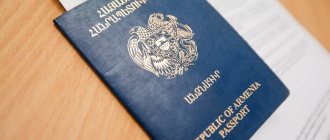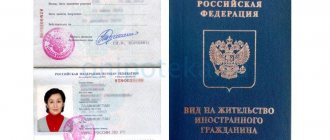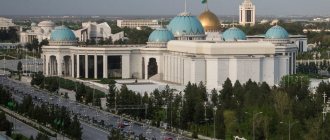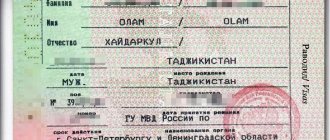When moving to a temporary place of residence, it is not always possible to obtain permanent registration. But it is the responsibility of citizens to register at their place of residence. This is necessary to take into account the migration of both Russian citizens and visiting foreigners. Those who have not registered for a long time will face a fine for living without registration at their place of residence. Administrative liability was introduced relatively recently, but ignorance of the law is not a reason to evade responsibility.
What is “place of residence”
If a citizen owns a residential premises in which he is registered and lives permanently, no difficulties will arise. Questions arise for those who do not have a permanent place of residence, change housing, or live for a long time in places not intended for this.
Place of residence includes only:
- Premises registered as residential buildings in the cadastre: house, apartment, room;
- Premises where permanent or temporary registration is possible.
Does not apply to places of residence:
- Buildings in SNT that are not registered as residential buildings. For example, a person owns a summer cottage, registered in the cadastre, but only “buildings” are listed on it: a bathhouse, a country house, a barn, etc.;
- Buildings designed as non-domestic buildings: warehouse, garage, store, utility room, etc.;
- Erected temporary shelters: tents, trailers, barracks;
- Mobile homes, vans, suitable for temporary overnight stays, but not suitable for permanent residence.
What is temporary registration in an apartment?
Temporary registration in an apartment is an opportunity to legally stay in a given apartment with the consent of its owner for an agreed period of time. This is confirmed by a special document - a certificate of temporary registration, and a mark in the apartment's house register. It is impossible to obtain such a document without the knowledge and consent of the owner, since the registration authority accepts the application only in the presence of both parties, or his authorized representative can act on behalf of the owner, confirming his authority with a notarized power of attorney.
Temporary registration differs from permanent registration in that it has a limited validity period . You cannot be permanently registered in several places, while nothing prevents you from moving from place to place as often as you like, each time receiving temporary registration at a new address, since your permanent registration remains unchanged. Citizens may not have permanent registration at all, which often happens due to the lack of their own real estate, but the lack of any registration is an offense.
Some citizens neglect temporary registration when living for a long time outside their permanent place of residence, but meanwhile it brings with it several positive aspects:
- It will serve as evidence for the management company at the place of permanent registration of temporary absence, so the amount of utility bills for this period will be recalculated downwards.
- You will not have to pay a fine for staying without registration.
- At the place of temporary registration, you can, like all other citizens, receive social services and find employment.
Also on topic: Termination of the right to use residential premises
What does official registration look like?
There are two types of registration:
- permanent – stamp in the passport on the “registration” page;
- temporary – certificate of temporary registration in residential premises.
Both forms are equivalent in terms of social and everyday privileges:
- Possibility to register at the clinic;
- The opportunity to get an official job with an entry in the work book;
- Opportunity to receive education - preschool and secondary;
- The opportunity to take advantage of the benefits of the region of residence (not for everyone; for some, permanent registration is required);
- Opportunity to obtain bank loans.
A citizen who has at least temporary registration on the territory of the Russian Federation can count on ensuring his personal rights.
How to make a temporary registration?
To obtain temporary registration, you must obtain the most important thing - the consent of the owner, if we are talking about privatized housing. The registration procedure for municipal housing is somewhat different. Let's consider all possible options:
- Temporary registration in a municipal apartment is possible only for a period of up to 6 months. (Article 80.2 of the Housing Code of the Russian Federation). After this you will need to register again. Consent is given not by the responsible tenant, but by the landlord, provided there is sufficient living space for all residents and registrants. The norm, according to the Housing Code of the Russian Federation, is 12 sq.m., but constituent entities may have their own coefficients. No one's consent is required to register a minor who is traveling with his or her parent or other legal representative.
- In a privatized apartment, a temporary new tenant can be registered only with the general consent of all persons registered in the given living space, in addition to the owner. If the living space belongs to several persons by the right of common or shared ownership, then all of them are required to be present in person at the FMS when registering a new tenant and confirm their consent. The number of square meters per tenant in this case does not play any role.
- Registration in a mortgaged apartment has its own characteristics, since until the mortgage loan is repaid, the apartment is under encumbrance (pledged by the bank). Here, judicial practice shows that one should start from the terms of the mortgage agreement. If the contract directly states that the borrower does not have the right to register anyone in the apartment, then this rule must be strictly observed. If there is no such condition in the text of the agreement, then the borrower will be able to notify the bank of his intention and carry out temporary registration of the tenant.
- Registration in an institution (sanatorium, hospital, hotel, etc.) occurs with the direct participation of the head of this institution or a person authorized by him. The citizen himself presents only his passport, and all other actions for temporary registration are carried out by an employee of the institution at the FMS. If you stay in an institution for less than 90 days, temporary registration is not carried out.
Also on the topic: What is an encumbrance on an apartment?
With these restrictions, the registration procedure as a whole looks simple : you need to go to the Federal Migration Service and submit documents in the presence of the home owner, and then receive a certificate of temporary registration, which must be included in your passport and presented upon request.
The legislative framework
- Federal Law “On Registration at the Place of Residence” (1993) obliges Russians who have changed their permanent place of residence to register at a new address. A person cannot be registered anywhere;
- Federal Law “On registration at the place of residence” (2014) - obliges those citizens who have changed their place of residence (but not registration) to obtain temporary registration for a period of more than 3 months;
- Migration legislation determines the procedure for registering foreign citizens;
- Article 19.15 of the Administrative Code - determines administrative liability and the amount of the fine for lack of registration. In addition, the Code of Administrative Offenses provides for sanctions for those on whose territory a citizen illegally resides. The fine for living at your place of stay depends on many factors.
What is a fake registration?
Registration at the place of stay (temporary registration) or place of residence (permanent registration) is a mandatory procedure both for citizens with Russian citizenship and for immigrants from foreign countries.
How to obtain temporary and permanent registration for a foreign citizen, read here.
Registration of a particular registration depends on the time that the citizen plans to live in one place. So, if a citizen lives in one place for more than three months, but no more than five years, he can limit himself to obtaining a temporary registration. If a citizen plans to live in a specific place on a permanent basis, it is worthwhile to apply for permanent registration.
Attention
In addition, the Law establishes specific deadlines during which a person is required to register at the place of stay (3 months)/residence (12 months). For violation of registration deadlines, a citizen is held accountable.
The main condition for registration is the availability of living space . And since not many people are able to find an apartment whose owner is willing to register it in their apartment, many of them have begun to provide this opportunity for a fee. The sale of registration for a specific living space, after registration of which the person registered will not live in it, is considered a fake registration (Article 2 of the Federal Law “On the right of citizens of the Russian Federation to freedom of movement”).
Why temporary registration is needed, read here.
It is important
Another type of fake registration is registration of registration using falsified documents that do not belong to the person registering.
Responsibility of Russian citizens
A citizen of the Russian Federation may not register and not be afraid of a fine if he:
- Lives in the same region where he is officially registered. For example, he is registered in a small regional town, but has been living in the regional center for several years;
- Lives with close relatives or on their territory. For example, he moved from the northern region to the south, where his mother and father have a small residential house. To prove that there is nothing to fine him for, you need to present a certificate of ownership of the house and proof of relationship. This applies only to immediate relatives: parents and children (both their own and adopted ones), siblings. To live in the house of a second cousin, you will have to register, if not permanently, then at least temporarily;
- If a citizen from another region lives with his wife, registration of the spouse and a marriage certificate will be sufficient to prove compliance with the law.
Important! This is often used by citizens who need official registration, for which they enter into fictitious marriages. This is a direct violation of the law.
In other cases, the citizen faces a fine of 2,000 to 5,000 rubles, depending on the region in which the offense was committed. The highest penalties for living without registration are in the cities of Moscow and St. Petersburg.
The owner of the premises, an individual, will also be held liable in the amount of 3-5 thousand rubles (the amount of the fine also depends on the region where the premises are located). A legal entity that has committed an offense can be brought not only to administrative liability (from 40 to 750 thousand rubles ), but also to criminal liability (up to 3 years of imprisonment).
Pros and cons – to register or not?
On the one hand, each of us is not assigned a FMS employee who carefully monitors compliance with the registration law. But on the other hand, the obligation to register means administrative liability for violating the requirements of the law.
If it is discovered that a citizen is living without permanent or temporary registration, he is given a fine , the amount of which depends on the region - in Moscow and St. Petersburg 3-5 thousand rubles, in other regions - 2-3 thousand rubles. (Article 19.15.1 of the Code of Administrative Offenses of the Russian Federation). The owner of the apartment where the unregistered citizens lived will also be fined: 3-5 thousand rubles. for regions, 5-7 thousand rubles. for Moscow and St. Petersburg. However, if the owner of the apartment is not an individual, but a legal entity, then the amount of the fine will be significantly higher - 50-757 thousand rubles. (300-800 thousand rubles for Moscow and St. Petersburg).
Responsibility of foreign citizens
A foreign citizen may not register on the territory of the Russian Federation if he does not plan to stay here for more than 3 months. In all other cases, fines are imposed:
- Up to 7 thousand rubles from an individual who is not registered in the Russian Federation and is not a citizen of the Russian Federation;
- Up to 7 thousand rubles from the owner who allowed a foreigner to live on his territory;
- up to 500 thousand rubles, if the owner is a legal entity.
Arriving in the country to study or work, a foreigner receives a residence permit. Within a week after this, he is obliged to temporarily register in the residential premises. There are many offenses associated with this. The fact is that many migrant workers do not have enough original documents to complete the full registration cycle. They are trying to obtain a fictitious “registration”:
- Foreigners who do not have enough documents or have false ones;
- Those who do not plan to live in the premises where they registered. If such a citizen commits an offense, it is almost impossible to catch him and bring him to justice, since it is actually unknown where he lives. Therefore, fictitious registration is punished especially severely.
The owner of the premises where the “fictitious migrant” is registered is held accountable:
- Administrative: a fine of up to 500 thousand rubles or withholding a percentage of income for the next three years;
- Criminal: forced labor or imprisonment for up to 3 years;
- Deprivation of the right to hold certain positions and carry out certain types of labor activities.
Responsibility for fictitious registration
Fictitious registration means registration in a residential premises without the intention of residing (arriving), or registration on the basis of knowingly false information.
For this act, Russian legislation provides for criminal liability under Art. 322.2 of the Criminal Code of the Russian Federation and Art. 322.3 of the Criminal Code of the Russian Federation, which provides for punishment in the form of a fine in the amount of 100 thousand to 500 thousand rubles. or in the amount of wages or other income of the convicted person for a period of up to 3 years, or forced labor for a period of up to 3 years with deprivation of the right to hold certain positions or engage in certain activities for a period of up to three years or without it, or imprisonment for a term of up to 3 years with or without deprivation of the right to hold certain positions or engage in certain activities for a period of up to 3 years.
Note: A person is exempt from criminal liability if he contributed to the disclosure of this crime and his actions do not contain other elements of the crime.
How to avoid fines
It is enough to prepare documents and contact migration control (passport and visa service, regional passport office, migration service, etc.).
Citizens of Russia:
- passport;
- application for temporary registration;
- departure and arrival sheets;
- the owner’s consent to registration on his territory (ideally, the owner’s presence at registration);
- For children under 14 years of age, a birth certificate will be required.
Foreigners:
- internal passport of your state, translated into Russian and notarized;
- migration card.










